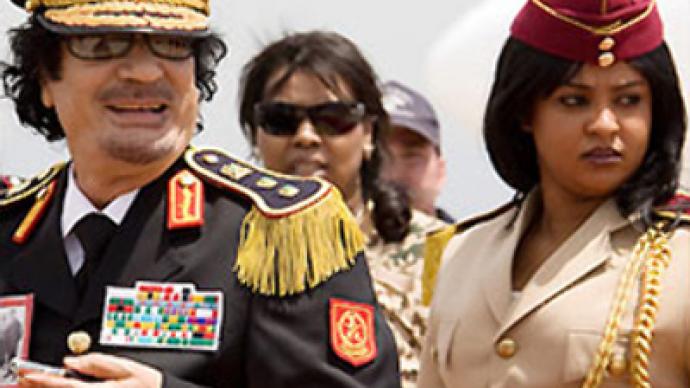Swiss jihad off? Geneva offers Gaddafi reparation over published mug shots

Geneva officials say they are willing to pay compensation to the playboy son of Libyan leader Muammar Gaddafi for the publication of mug shots from his 2008 arrest.
The canton of Geneva, in a motion before the local court, says it regrets the publication of official police photographs of Hannibal Gaddafi, 34, by Tribune de Geneve in September last year.
In September of last year, more than one year after Hannibal Gaddafi’s arrest, Tribune de Geneve published his police mug shots alongside a derisive article. Gaddafi responded with a civil complaint against the newspaper and the cantonal government, demanding 100,000 Swiss francs (US$94,500) in reparation.
Swiss news agency SDA and Swiss TV SF reported late Tuesday that officials in Geneva did not specify exactly how much they were ready to pay. But Geneva authorities said they want the newspaper to pay its fair share because it bears the main responsibility for publishing the unflattering photos.
Hannibal Gaddafi was detained in Geneva on July 15 2008 for allegedly assaulting two female staff at a luxury hotel. He was held in detention for two days before being released on a police bond; but the Libyan leader is not somebody who easily forgets a slight, and the seemingly minor incident sparked a nasty response: Libya halted oil shipments to Switzerland, made multi-billion-dollar withdrawals from Swiss bank accounts and arrested two Swiss businessmen, Max Goeldi and Rachid Hamdani, in the North African country.
Switzerland responded by issuing a travel ban to 188 high-level Libyans, allegedly including Gaddafi himself. No senior Libyan is permitted to visit the 25-country, passport-free Schengen zone.
Now the ball was back into Tripoli’s court. Libya retaliated by imposing a trade embargo against Switzerland and forbidding citizens from 25 European countries from visiting the oil-rich country.
But then things really took a turn for the worse when Swiss voters in November backed a referendum proposal banning the building of minarets (a tower on some mosques that traditionally summons people to prayer).
The controversial proposal was brought forward by the Swiss People’s Party, which – following years of loose immigration policies that have altered Swiss demographics (4.3 per cent of Switzerland professes to Islam) – tapped into a rich source of public anxiety.
In February, during a celebration to mark the Prophet Muhammad's birthday, Gaddafi described the neutral country as an infidel state that was “destroying” mosques, and forbade Muslims from doing business there.
“Any Muslim in any part of the world who works with Switzerland is an apostate – is against Muhammad, God and the Koran,” Gaddafi said.
The eccentric Libyan leader had been working hard to reform his ways since the 1988 bombing of Pan Am 103 over Lockerbie, which resulted in the deaths of 270 people. In 2003, the Libyan government accepted civil – but not criminal – responsibility for the bombing, and agreed to pay $2.7 billion dollars in compensation to the families of the victims.
While the Swiss and Libyans may be hoping that the offer of reparations to Mr. Gaddafi will heal the bilateral wounds between the countries, there are other flashpoints in relations between “native” Europeans and their new Islamic neighbors that are cause for concern.
On September 30, 2005, the Danish newspaper Jyllands-Posten caused uproar with the publication of 12 cartoons poking fun at Islam in general and the Prophet Muhammad in particular. The paper said its inflammatory publication was an attempt to contribute to the debate regarding self censorship in the face of religious pressure.
More recently, Dutch anti-Islam politician Geert Wilders, fresh after winning a local election, was met with protests during a visit last week to Britain, where he showed his anti-Islam film “Fitna” a 15-minute short which associates the Koran with Islamist terror.












